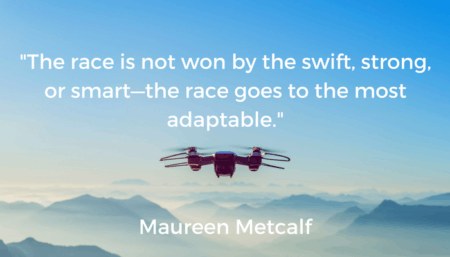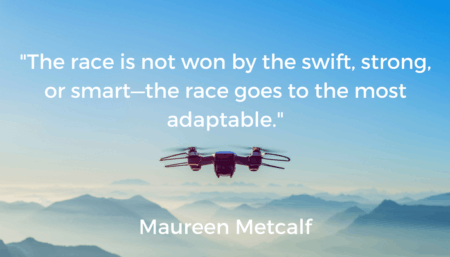
This blog a companion to the Voice America Interview on “Innovative Leaders Driving Thriving Organizations” with Jeroen van der Veer and Cynthia Cherrey, PhD on March 27, 2018, Nexus of Leadership and Practice: Royal Dutch Shell and International Leadership Association. The following is an excerpt from the International Book Award Winning, Innovative Leadership Workbook for Global Leaders by Maureen Metcalf, Steve Terrell PhD, and Ben Mitchell.
The national economies of the world have grown to be so integrated and interdependent over the past twenty-five years that a significant number of companies operate today as if the entire world were a single market or entity, comprising many different, interconnected sub-markets, and crossing borders, cultures, time zones, and languages. This high degree of interconnectedness or globalization, brought about through the impact and use of technology, melds with the chaos and continuous change of today’s business environment to create a highly dynamic, complex, borderless, multicultural context within which businesses must learn to operate, or suffer the undesirable consequences of being left behind. Organizations must find constructive ways to adapt to survive, and the most adaptable organizations will be best positioned to explore all possibilities and to respond with innovative solutions to the complex challenges they face.
Organizations are discovering that globalization demands that leaders master different skills than were required in the past. The world is increasingly characterized by volatility, uncertainty, complexity, and ambiguity (VUCA), and global leaders need new competencies that enable them to respond accordingly. Global leaders deal with intricacies that differ significantly from non-global contexts and must demonstrate cultural adaptability and sensitivity. Yet, many organizations are finding that their supply of global leaders, or even individuals with the potential to become global leaders, does not match the demand. In today’s world, the race is not won by the swift, strong, or smart—the race goes to the most adaptable, those who learn from experience and co-evolve with the complex adaptive systems within which they work and live.
Leadership plays a critical role in an organization’s long-term success, and innovation has become a strategic necessity in today’s business environment. In short, global leadership and innovation have a greater impact today than ever before. Despite the volume of resources exploring both leadership and innovation, most approaches provide directional solutions that are merely anecdotal and lack sufficient information to allow leaders to make measurable change. Add to this equation the importance of developing global skills, and leaders face an even greater challenge. Technology and increased access to information continue to accelerate the pace of business and of change and organizations are often too overrun with change to handle the torrent of emerging demands.
Questions on how to lead and where to innovate remain puzzlingly philosophically: What is the role of global leadership in a time of looming uncertainty? How will organizations innovate to overcome challenges that are largely unprecedented? In a new climate of business, is there a formula for creating success in both areas?
Becoming a better global leader and optimizing innovation jointly hinge on your ability, as a leader, to authentically examine your own inner makeup and diligently address some challenging limitations. Leadership innovation happens naturally and can be accelerated through the use of a structured processes involving your own self-exploration, allowing you to authentically enhance your leadership beyond tactical execution.
Despite their collective value, many conventional applications of leadership and innovation have often proven elusive and even problematic in real-world scenarios. For example, if the leadership team of a struggling organization drives initiatives that focus solely on making innovative changes to incentives, products, and services, without also advancing strategic purpose, culture, and team cohesiveness, they will ultimately miss the greater potential to create a comprehensive turn- around in the organization. Productivity and system improvements are undoubtedly critical, but how employees make sense of their work experience is equally vital to team engagement and commitment. Innovating products and improving functionality—without also creating a better and more meaningful team environment, or a more supportive organizational culture—often appears to pay off in the short term, yet produces lopsided decision-making and shortsighted leadership that create lasting adverse consequences.
Knowing that the future of organizations is irrevocably tied to a world of erratic change, we can no longer afford to improve our systems and offerings without equally advancing our leadership capacity. Leadership empathy and the ability to inspire cultural alignment, along with other important leadership activities, will make a significant impact on your organization and must be implemented as shrewdly as is strategic planning.
Combining global leadership with innovation, then, requires you to transform the way you perceive yourself, others, and your business. By earnestly looking at your own experience—including motivations, inclinations, interpersonal skills, and proficiencies—you can optimize your effectiveness in the current dynamic environment. Through reflection, you learn to balance the hard skills you have acquired through experience with the meaningful introspection attained through deep examination— all the while setting the stage for further growth. In essence, you discover how to strategically and tactically innovate leadership the same way you innovate in other aspects of your business.
To become a more innovative leader, please consider our online leader development program. For additional tools, we recommend taking leadership assessments, using the Innovative Leadership Fieldbook and Innovative Leaders Guide to Transforming Organizations, and adding coaching to our online innovative leadership program. We also offer several workshops to help you build these skills.
About the Author
Maureen Metcalf, CEO and Founder of Metcalf & Associates, is a renowned executive advisor, author, speaker, and coach whose 30 years of business experience provides high-impact, practical solutions that support her clients’ leadership development and organizational transformations. Maureen is recognized as an innovative, principled thought leader who combines intellectual rigor and discipline with an ability to translate theory into practice. Her operational skills are coupled with a strategic ability to analyze, develop, and implement successful strategies for profitability, growth, and sustainability.





